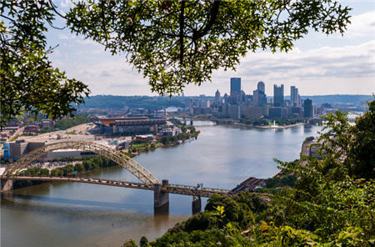Pittsburgh's Water And Sewer Authority Pleads Guilty To Clean Water Act Violations


One of the country’s largest drinking water and wastewater utilities has admitted fault for violating a central federal regulation, leading to some harsh penalties.
“The Pittsburgh Water and Sewer Authority (PWSA) pleaded guilty … to Clean Water Act (CWA) violations in connection with an investigation of sludge discharge into the Allegheny River,” the Pittsburgh Post-Gazette reported. “PWSA pleaded to one count of violating its National Pollutant Discharge Elimination System Permit by discharging sludge and to one count of making false statements in reports about the amount of sludge it was sending to its waste treatment facility.”
The violations can be traced back to Glenn Lijewski, a PWSA maintenance superintendent who has been indicted for conspiracy to violate the CWA.
“The indictment accuses Mr. Lijewski of being directly responsible for the unauthorized discharge of sludge from the water plant’s clarifiers into the river in violation of PWSA’s discharge permit,” per the Post-Gazette. “The charges further allege that Mr. Lijewski directed other plant workers to discharge sludge into the river and says that during a four-year period when the sludge flow meters were broken, Mr. Lijewski directed employees to file false reports estimating sludge flow amounts instead of real numbers.”
As a result of the guilty plea, PWSA faces three years of probation and a $500,000 payment into a compliance fund, which cannot be funded by ratepayers. The authority will also have to provide annual, publicly available environmental audits to the U.S. EPA and U.S. attorney. It will also have to host an environmental compliance manager at one of its plants, and ensure that employees can report violations without fear of retaliation.
Those who get their drinking water from local source bodies are doubtlessly hopeful that these measures, along with the removal of Lijewski, will lead to compliant operations from the PWSA.
And Pittsburgh has recently agreed to terms with the EPA on its storm sewer system as well. A consent agreement will see the city amend its stormwater code to add inspectors and install management partnership procedures, all by the end of 2022.
“Mayor William Peduto, in a … letter to council, wrote that by the end of March 2022, the city should complete implementation of its inspection and enforcement program for the National Pollutant Discharge Elimination System (NPDES) permit reissued by the EPA in July 2020,” according to a separate report from the Post-Gazette. “According to the mayor’s letter, the city has been ‘out of compliance with inspection and enforcement requirements’ of the NPDES permit.”
To read more about the rules that govern drinking water systems, visit Water Online’s Regulations And Legislation Solutions Center.
